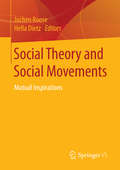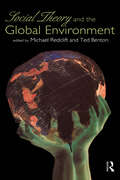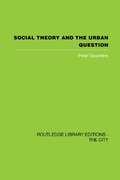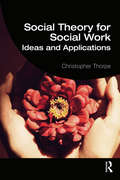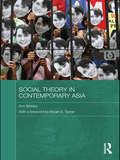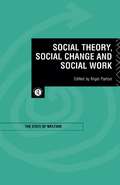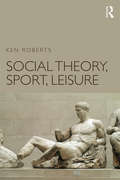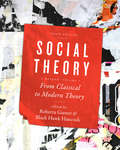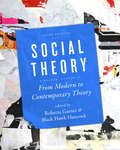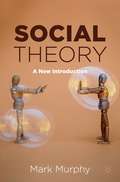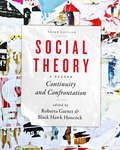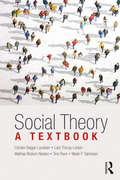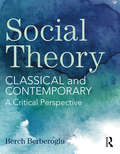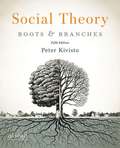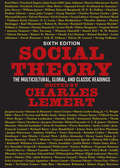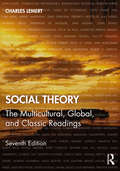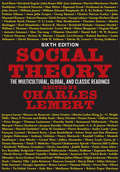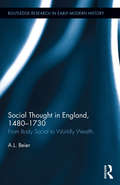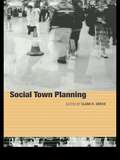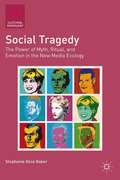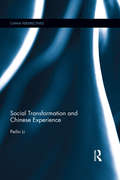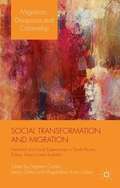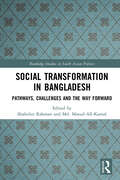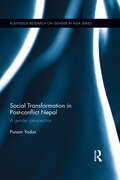- Table View
- List View
Social Theory and Social Movements
by Jochen Roose Hella DietzThe volume will address two questions arising in the context of social movements: What do we learn about social movements by adopting the perspectives offered by specific social theories? Can the confrontation with social movements also help to further develop or revise these social theories? Social movements are not only a potential challenge to societies, they also challenge social theory. "Social Theory and Social Movements" systematically explores the implications of this social force for theory building in the social sciences. From this double vantage point, the book discusses the theories of social movements of Niklas Luhmann, Jeffrey Alexander, Michel Foucault, Pierre Bourdieu and Judith Butler, as well as Rational Choice Theory, Relational Sociology and Organizational Neo‐Institutionalism.
Social Theory and the Global Environment (Global Environmental Change Ser.)
by Ted Benton Michael RedcliftThis book marks a watershed in the social sciences. The qualitative, critical perspective of sociology and allied disciplines challenges the technocentric `managerialism' which dominates environmental policy, its discourse and its impact. The authors explore the relationship between social theory and sustainability in an attempt to transend technical rhetoric and embrace a broader understanding of `nature'.
Social Theory and the Urban Question
by Peter SaundersSocial Theory and the Urban Question offers a guide to, and a critical evaluation of key themes in contemporary urban social theory, as well as a re-examination of more traditional approaches in the light of recent developments and criticism. Dr Saunders discusses current theoretical positions in the context of the work of Marx, Weber and Durkheim. He suggests that later writers have often misunderstood or ignored the arguments of these 'founding fathers' of the urban question. Dr Saunders uses his final chapter to apply the lessons learned from a review of their work in order to develop a new framework for urban social and political analysis. This book was first published in 1981.
Social Theory for Social Work: Ideas and Applications (Student Social Work)
by Christopher ThorpeTrying to understand how the world looks through the eyes of individuals and groups and how it shapes the ways they think and act is something social workers do all the time. It is what social theorists do too. This book identifies and explains in a highly accessible manner the absolute value of social theory for social work. Drawing on the theoretical ideas and perspectives of a wide range of classical and modern social theorists, the book demonstrates the insights their work can bring to bear on a wide range of social work practice scenarios, issues and debates. Departing with the work of the classical theorists, the book covers a diverse range of theoretical traditions including phenomenology, symbolic interactionism, Norbert Elias, Michel Foucault, Pierre Bourdieu, feminism and globalization theory. Putting to work ideas from these different perspectives, a range of social work scenarios, issues and debates are opened up and explored. The final chapter brings together the various theoretical strands, and critically considers the contribution they can make towards realizing core social work values in a rapidly globalizing world. Demonstrating exactly how and in what ways social theory can make important and enduring contributions to social work, Social Theory for Social Work is essentialial reading for social work students, practitioners and professionals alike.
Social Theory in Archaeology and Ancient History
by Geoff EmberlingAt a time when archaeology has turned away from questions of the long-term and large scale, this collection of essays reflects on some of the big questions in archaeology and ancient history - how and why societies have grown in scale and complexity, how they have maintained and discarded aspects of their own cultural heritage, and how they have collapsed. In addressing these long-standing questions of broad interest and importance, the authors develop counter-narratives - new ways of understanding what used to be termed 'cultural evolution'. Encompassing the Middle East and Egypt, India, Southeast Asia, Australia, the American Southwest and Mesoamerica, the fourteen essays offer perspectives on long-term cultural trajectories; on cities, states and empires; on collapse; and on the relationship between archaeology and history. The book concludes with a commentary by one of the major voices in archaeological theory, Norman Yoffee.
Social Theory in Contemporary Asia (Routledge Studies in Social and Political Thought)
by Ann BrooksPhilosophical debates around individualization and the implications for intimacy, reflexivity and identity have occupied a central part of social and cultural theorizing in the West in the last decade. In fact, late modernity has become conspicuously engaged with issues of intimacy, reflexivity and identity. The author analyses the relevance of these debates in the context of contemporary Asia and combines an analysis of significant social theorists including Beck, Giddens, Bourdieu, McNay, Adkins, and Ong with an application of these debates to social, political and cultural contexts. Drawing on empirical research, case studies, global reports, media and academic literature, the book provides a relevant, wide-ranging and contemporary analysis of the debates on Asian culture and society. In the Foreword to the book Bryan Turner comments: ‘Professor Brooks shows consequently that the intimate and emotional cultures that have been described by Anthony Giddens and Ulrich Beck with respect to the West have not arrived in Asia or at least that they have not become visible and permanent aspects of the social landscape.’
Social Theory, Social Change and Social Work
by Nigel PartonSocial Theory, Social Change and Social Work has two inter-related themes. First to account for and analyse current changes in social work and secondly, to assess how far recent developments in social theory can contribute to their interpretation. Representing the work of a range of academics all involved in research and teaching in relation to social work, it considers issues of central significance to everyone interested in the theory, policy, and practice of social work.
Social Theory, Sport, Leisure
by Ken RobertsKen Roberts’ Social Theory, Sport and Leisure offers a clear, compact primer in social theory for students needing to engage with the application of sociological perspectives to the study of sport and leisure. Written in a straightforward style and assuming no prior knowledge, the book offers a fresh and easy to read overview of sociology’s contribution to sport and leisure studies. Ordered chronologically, each chapter: Focuses on the work of a major social theorist and their most influential ideas Provides helpful historical and biographical detail to set the person and their thinking in contemporary context Identifies questions in sport and leisure on which the theory can shed useful light Considers how the ideas can be, or have been, applied in the study of sport and leisure Works as a self-contained unit, enabling students and lecturers to use the book flexibly according to their needs. Written by an outstanding sociologist of leisure and sport, this intelligent yet jargon-free textbook enables students to get to grips with a wide range of important concepts and understand their diverse applications. As such, it is essential reading for any course designed to explore the place and meaning of sport and leisure in society.
Social Theory, Volume I: From Classical to Modern Theory, Third Edition
by Black Hawk Hancock Roberta GarnerThe third edition of this popular reader reflects considerable changes. The framework for understanding theory as a set of conversations over time is maintained and deepened, pairing classical with contemporary readings to illustrate the ways in which theory continues to be reinterpreted over time. Volume I has been completely reorganized, with new contextual and biographical materials surrounding the primary readings, and end-of-chapter study guides that include key terms, discussion questions, and innovative classroom exercises. The result is a fresh and expansive take on social theory that foregrounds a plurality of perspectives and reflects contemporary trends in the field, while being an accessible and manageable teaching tool.
Social Theory, Volume II: From Modern to Contemporary Theory, Third Edition
by Black Hawk Hancock Roberta GarnerThe third edition of this popular reader reflects considerable changes. The framework for understanding theory as a set of conversations over time is maintained and deepened, but Volume II now begins with a focus on key transitional theorists who helped reconceive of classical theory in new ways. Extending from the classical tradition, chapters on race, gender, culture, media and globalization show how contemporary theory builds on the past even as it moves in new directions. New contextual and biographical materials surround the primary readings, and each chapter includes a study guide with key terms, discussion questions, and innovative classroom exercises. The result is a fresh and expansive take on social theory that foregrounds a plurality of perspectives and reflects contemporary trends in the field, while being an accessible and manageable teaching tool.
Social Theory: A New Introduction
by Mark MurphyThis textbook delivers a new thematic introduction to social theory that explores theoretical issues in their contemporary social contexts. Each chapter is devoted to a specific thematic area, including the state, governance, the economy, civil society, culture, language, knowledge, the self, emotions, the body, and social justice. Each chapter details the key issues for debate and the relevant theories while linking those debates and theories to everyday life. Distributed throughout the chapters are focused sections on key concepts and their research applications, alongside helpful additional detail including a glossary, further suggested readings, chapter summaries, and questions for discussion. The book also provides useful information on key theoretical movements such as feminism, Marxism, and post-structuralism, as well as biographies of key theorists. As such, it reflects the breadth of social theory and its interdisciplinary nature by drawing on thinkers not just from sociology, but also from philosophy, history, literature, geography, cultural and gender studies.The book’s logical structure and clear pedagogical features make it an appealing and accessible introductory text for students new to social theory. The chapters demonstrate the relevance of social theory to everyday life, such that readers can understand and actively engage with key concepts.
Social Theory: A Reader, Third Edition
by Black Hawk Hancock Roberta GarnerThe third edition of this popular reader reflects considerable changes. With over seventy readings representing a wide diversity of theorists, it offers a breadth of coverage not available in other collections. The framework for understanding theory as a set of conversations over time is maintained and deepened, with a focus on key transitional theorists who helped pave the way from classical to contemporary theory. New contextual and biographical materials surround the primary readings, and each chapter includes a study guide with key terms, discussion questions, and innovative classroom exercises. The result is a fresh and expansive take on social theory that foregrounds a plurality of perspectives and defines contemporary trends in the field, while being both an accessible and manageable teaching tool.
Social Theory: A Textbook
by Lars Thorup Larsen Mads P. Sørensen Mathias Wullum Nielsen Tine Ravn Carsten Bagge LaustsenThis textbook offers a new approach to understanding social theory. Framed around paired theoretical perspectives on a series of sociological problems, the book shows how distinctive viewpoints shed light on different facets of social phenomena. The book includes sociology’s "founding fathers", major 20th-century thinkers and recent voices such as Butler and Zizek. Philosophically grounded and focused on interpretation and analysis, the book provides a clear understanding of theory’s scope while developing students’ skills in evaluating, applying and comparing theories.
Social Theory: Classical and Contemporary – A Critical Perspective
by Berch BerberogluSocial Theory provides a sophisticated yet highly accessible introduction to classical and contemporary social theories. The author’s concise presentation allows students and instructors to focus on central themes. The text lets theorists speak for themselves, presenting key passages from each theorist’s corpus, bringing theory to life. The approach allows instructors the opportunity to help students learn to unpack sometimes complex prose, just as it offers inroads to class discussion. Chapters on Addams and early feminism, on Habermas and the Frankfurt School, on Foucault, and on globalization and social movements round out contemporary coverage. The book presents and explains key theories, just as it provides an introduction to central debates about them.
Social Theory: Roots And Branches (Fifth Edition)
by Peter KivistoEdited by Peter Kivisto, this acclaimed collection of accessible primary source readings enables students to experience "firsthand" a wide range of perspectives that are shaping current sociological theory. Now in its fifth edition, Social Theory: Roots and Branches covers both classical theory (the roots) and contemporary theory (the branches) and shows how they are linked. Part One features work from such well-known classical theorists as Marx, Durkheim, Weber, and Simmel. It also presents selections by theorists outside of the discipline and from writers who are often overlooked in competing collections, including W. E. B. Du Bois, Charlotte Perkins Gilman, and Harriet Martineau. Part Two offers readings that illustrate major contemporary theoretical approaches, ending with a section on cutting-edge directions in theoretical discourse. Now featuring a revised and expanded introductory chapter, this fifth edition offers seventeen new readings, including eight by theorists who are new to this collection.
Social Theory: The Multicultural, Global, and Classic Readings
by Charles LemertFor nearly a quarter-century, Charles Lemert has shared his love of social theory, and the questions it explores, in this collection of readings. With 140 selections that begin in the nineteenth century and end in 2015, Social Theory charts the long arc of the development of the field. This edition retains classic texts by Karl Marx, Emile Durkheim, Max Weber, and W.E.B. Du Bois and writings of major contemporary figures like Audre Lorde and Patricia Hill Collins, while adding pieces from Harriet Martineau, Friedrich Nietzsche, Kimberlé Williams Crenshaw, Thomas Piketty, and Ta-Nehisi Coates, among others. Revised and updated with a new section exploring social theory at the limits of the social, Lemert's Social Theory remains essential reading.
Social Theory: The Multicultural, Global, and Classic Readings
by Charles LemertSocial Theory is more than a reader. Feminists, race theorists, decolonizing leaders, and others are thoughtfully introduced by Charles Lemert’s substantial commentaries. Social Theory has always sought to keep up with the new while respecting the old—from Durkheim and Weber to Latinx and LGBTQ pioneers. When the book first appeared it was, as it remains, a collection of selections from those who have changed how we think about social things. Today, as the world is threatened by a global wave of anti-democratic movements, Social Theory adds a new early section to remind us of the origins of democratic values in 1700s. A new concluding section focuses the theoretical mind on how, in the 2020s, social theorists are rethinking the world in order to better understand and resist the menace of anti-democratic movements.
Social Theory: The Multicultural, Global, and Classic Readings (Sixth Edition)
by Charles LemertFor nearly a quarter-century, Charles Lemert has shared his love of social theory, and the questions it explores, in this collection of readings. With 140 selections that begin in the nineteenth century and end in 2015, Social Theory charts the long arc of the development of the field. This edition retains classic texts by Karl Marx, Emile Durkheim, Max Weber, and W.E.B. Du Bois and writings of major contemporary figures like Audre Lorde and Patricia Hill Collins, while adding pieces from Harriet Martineau, Friedrich Nietzsche, Kimberly Williams Crenshaw, Thomas Piketty, and Ta-Nehisi Coates, among others. Revised and updated with a new section exploring social theory at the limits of the social, Lemert's Social Theory remains essential reading.
Social Thought in England, 1480-1730: From Body Social to Worldly Wealth
by A.L. BeierAuthorities ranging from philosophers to politicians nowadays question the existence of concepts of society, whether in the present or the past. This book argues that social concepts most definitely existed in late medieval and early modern England, laying the foundations for modern models of society. The book analyzes social paradigms and how they changed in the period. A pervasive medieval model was the "body social," which imagined a society of three estates – the clergy, the nobility, and the commonalty – conjoined by interdependent functions, arranged in static hierarchies based upon birth, and rejecting wealth and championing poverty. Another model the book describes as "social humanist," that fundamentally questioned the body social, advancing merit over birth, mobility over stasis, and wealth over poverty. The theory of the body social was vigorously articulated between the 1480s and the 1550s. Parts of the old metaphor actually survived beyond 1550, but alternative models of social humanist thought challenged the body concept in the period, advancing a novel paradigm of merit, mobility, and wealth. The book’s methodology focuses on the intellectual context of a variety of contemporary texts.
Social Town Planning
by Clara H. GreedMany issues such as access for the disabled, childcare facilities, environmental matters, and ethnic minority issues are excluded from town planning considerations by planning authorities. This book introduces the concept of `social town planning' to integrate planning policy and practices with the cultural and social issues of the people they are planning for. Part 1 provides background on the development of a social dimension to the predominantly physical, land use based, British town planning system. Part 2 investigates a representative selection of minority planning topics, in respect of gender, race, age and disability, cross-linked to the implications for mainstream policy areas such as housing, rural planning and transport. Part 3 discusses the likely influence of a range of global and European policy initiatives and organisations in changing the agenda of British town planning. Planning for healthy cities, sustainability, social cohesion, and equity are discussed. Part 4 looks at `the problem' from a cultural perspective, arguing that a great weakness in the British system, resulting in ugly and impractical urban design, has been the lack of concern among planners with social activities and cultural diversity. Alternative, more culturally inclusive approaches to planning are presented which might transcend the social/spatial dichotomy, such as urban time planning. Concluding that the process of planning must change, the authors ague that the culture and composition of the planning profession must particularly change to be more representative and reflective of the people they are `planning for', in terms of gender, race and minority composition.
Social Tragedy
by Stephanie Alice BakerA social tragedy is a collective representation of injustice. Baker demonstrates how social tragedies facilitate moral action and discusses a series of contemporary case studies - the death of Princess Diana, Zin#65533;dine Zidane's 2006 World Cup scandal, KONY 2012 - to examine their social and political effects.
Social Transformation and Chinese Experience (China Perspectives)
by Peilin LiChina's success on economic growth and its exploration on political reform in the past few decades have attracted the attention from worldwide economic and political experts. This book studies China's transformation and experience from a sociological perspective, which broadens the research horizons and explores more complexity in contemporary China. This book examines China's social structural transformation, especially its implications on resource allocation and expounds on China's sociology academic history. In addition, it covers a broad range of issues including China's experience of reform and development, urbanization, social hierarchy change, social conflicts, social management, mass consumption, etc. Lastly, it investigates China's "urban village" as a byproduct of economic development and urbanization, which is rarely seen in other countries. These themes are key to understanding contemporary Chinese society, which makes this book a valuable reference for specialists on Chinese studies and those who are interested in contemporary China.
Social Transformation and Migration
by Stephen Castles Derya Ozkul Magdalena Arias CubasThis book examines theories and specific experiences of international migration and social transformation, with special reference to the effects of neo-liberal globalization on four societies with vastly different historical and cultural characteristics: South Korea, Australia, Turkey and Mexico.
Social Transformation in Bangladesh: Pathways, Challenges and the Way Forward (Routledge Studies in South Asian Politics)
by Shahidur RahmanSocial Transformation in Bangladesh explores the social, political, and cultural implications of the unprecedented economic development that has occurred in Bangladesh since its independence in 1971.In the 1970s, Bangladesh was labelled an international basket case because of food insecurity and low levels of per capita income with high population growth and various social problems. Defying overwhelming odds, however, a societal transformation is underway in Bangladesh with diverse opportunities and challenges. This edited book analyses issues of inclusivity, extractivism, sustainability and equitability as it takes a look at the interconnected metamorphosis of the economy, society, culture, and the environment of Bangladesh. Discussing topics from the products of post-industrial society, such as YouTube sensations and digital labour platforms, to groups that have suffered marginalisation for decades, such as the urban poor, and Indigenous peoples, a wide array of scholarship and case studies are used to analyse the challenges and opportunities offered by the process of societal transformation.With insights from multidisciplinary scholars, this collection will be of great interest to those specialising in the fields of sociology, political science, anthropology, development, refugee and migrant studies, media studies, labour studies, health, and indigeneity.
Social Transformation in Post-conflict Nepal: A Gender Perspective (Routledge Research on Gender in Asia Series)
by Punam YadavThe concept of social transformation has been increasingly used to study significant political, socio-economic and cultural changes affected by individuals and groups. This book uses a novel approach from the gender perspective and from bottom up to analyse social transformation in Nepal, a country with a complex traditional structure of caste, class, ethnicity, religion and regional locality and the experience of the ten-year of People’s War (1996-2006). Through extensive interviews with women in post-conflict Nepal, this book analyses the intended and unintended impacts of conflict and traces the transformations in women’s understandings of themselves and their positions in public life. It raises important questions for the international community about the inevitable victimization of women during mass violence, but it also identifies positive impacts of armed conflict. The book also discusses how the Maoist insurgency had empowering effects on women. The first study to provide empirical evidence on the relationship between armed conflict and social transformation from gender’s perspectives, this book is a major contribution to the field of transitional justice and peacebuilding in post-armed-conflict Nepal. It is of interest to academics researching South Asia, Gender, Peace and Conflict Studies and Development Studies.
